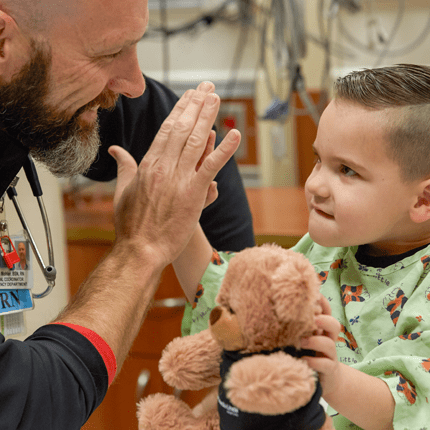Endocrinology Conditions and Treatments
- Adrenal Gland Problems
- Diabetes Insipidus
- Diabetes Type I
- Diabetes Type II
- Disorders of Sexual Differentiation
- Growth Problems
- Hypoglycemia
- Hypoparathyroidism
- Hypopituitarism
- Hypothyroidism
- Problems in Puberty
The Division of Pediatric Endocrinology also treats the following:
- Adrenal gland disorders including CAH (congenital adrenal hyperplasia) and Adrenoleukodystrophy
- Survivors of childhood cancer
- Thyroid Problems including hypothyroidism, Hashinoto's thyroiditis, Graves disease/hyperthyroidism, thyroid nodules, and thyroid cancer
The Division also works closely with the Neurosurgical, Cardiovascular and General surgical teams as well as Nephrology, Pulmonary, Hematology/Oncology, Immunology and Gastroenterology.
Endocrinology Services and Innovations
The Division of Endocrinology at the Children’s Hospital of Michigan provides comprehensive care to children/pediatric patients with endocrine problems and diabetes mellitus.
Specialized services offered to newborns and older children include growth hormone testing and treatment, outpatient education, regular follow-up phone calls and research studies. Children with congenital adrenal hyperplasia, hypopituitarism, short stature, thyroid and parathyroid problems, diabetes insipidus, precocious puberty and other endocrine problems are regularly followed up in clinic by the pediatric endocrinologist, a pediatric nurse practitioner, endocrine nurses and a dietitian.
The Endocrinology Division at the Children’s Hospital of Michigan also offers the following services:
- Classes for patients with new onset diabetes mellitus, 6 times a year
- Insulin pump and continuous glucose monitoring classes, 6 times a year
- Detroit area school nurse training program in August
- A quarterly diabetes newsletter offering useful tips to manage diabetes. To receive the newsletter please email [email protected]
- Diabetes mellitus support group
- World Diabetes Day event yearly
The Diabetes Clinic treats the largest group of African-American children/pediatric patients with Type I diabetes in the country. Utilizing a team approach, the service consists of evaluation from a physician, a pediatric nurse practitioner, a diabetes educator, a dietitian and a social worker. A state certified and American Diabetes Association (ADA) certified outpatient education program is also offered to help children and their families effectively manage a Type 1 diabetes diagnosis. The Division uses insulin pumps and CGM (continuous glucose monitoring) for patient care. A diabetes phone hour is available every weekday for insulin dose changes, prescription refills and other requests. Communication with families is offered via phone, fax and email for patient convenience.Outpatient education classes which meet the national standards for diabetes self-management education of the American Diabetes Association and the Michigan Department of Community Health are also conducted monthly. The doctors in the Division of Endocrinology also share their expertise throughout Michigan through the Wayne State University Morris J. Hood, Jr., Diabetes Center.





